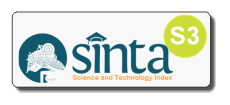Pengaruh Neuroticism Terhadap Emotional Eating
Abstract
Full Text:
PDF (Bahasa Indonesia)References
Alsa, A. (2001). Kontroversi Uji Asumsi Dalam Statistik Parametrik. Buletin Psikologi, 9(1), 18–22. https://doi.org/10.22146/bpsi.7437
Arnow, B., Kenardy, J., & Agras, W. S. (1995). The emotional eating scale: The development of a measure to assess coping with negative affect by eating. International Journal of Eating Disorders, 18(1), 79–90. https://doi.org/10.1002/1098-108X(199507)18:1<79::AID-EAT2260180109>3.0.CO;2-V
Azwar, S. (2001). Asumsi-Asumsi Dalam Inferensi Statistika. Buletin Psikologi, 9(1), 8–17. https://doi.org/10.22146/bpsi.7436
Beaton, D. E., Bombardier, C., Guillemin, F., & Ferraz, M. B. (2000). Guidelines for the Process of Cross-Cultural Adaptation of Self-Report Measures. SPINE, 25(4), 225–230. https://doi.org/10.1080/000163599428823
Bogg, T., & Roberts, B. W. (2004). Conscientiousness and health-related behaviors: A meta-analysis of the leading behavioral contributors to mortality. Psychological Bulletin, 130(6), 887–919. https://doi.org/10.1037/0033-2909.130.6.887
Cahanar, P., & Suhanda, I. (2006). Makan Sehat, Hidup Sehat. https://doi.org/https://doi.org/10.3929/ethz-b-000238666
Cardi, V., Leppanen, J., & Treasure, J. (2015). The effects of negative and positive mood induction on eating behaviour: A meta-analysis of laboratory studies in the healthy population and eating and weight disorders. Neuroscience and Biobehavioral Reviews, 57, 299–309. https://doi.org/10.1016/j.neubiorev.2015.08.011
Costa, P. T., & McCrae, R. R. (2008). The revised NEO personality inventory (NEO-PI-R). In The SAGE Handbook of Personality Theory and Assessment: Volume 2 - Personality Measurement and Testing (pp. 179–198). https://doi.org/10.4135/9781849200479.n9
Deary, I. J., Weiss, A., & Batty, G. D. (2010). Intelligence and personality as predictors of illness and death: How researchers in differential psychology and chronic disease epidemiology are collaborating to understand and address health inequalities. Psychological Science in the Public Interest, Supplement, 11(2), 53–79. https://doi.org/10.1177/1529100610387081
Dovey, M. T. (2010). Eating Behaviour. Retrieved from https://www.ucl.ac.uk/iehc/research/behavioural-science-health/resources/questionnaires/eating-behaviour-questionnaires/#fcq
Elfhag, Krislina, & Linné, Y. (2005). Gender differences in associations of eating pathology between mothers and their adolescent offspring. Obesity Research, 13(6), 1070–1076. https://doi.org/10.1038/oby.2005.125
Elfhag, Kristina, & Morey, L. C. (2008). Personality traits and eating behavior in the obese: Poor self-control in emotional and external eating but personality assets in restrained eating. Eating Behaviors, 9(3), 285–293. https://doi.org/10.1016/j.eatbeh.2007.10.003
Elfhag, Kristina, Tholin, S., & Rasmussen, F. (2008). Consumption of fruit, vegetables, sweets and soft drinks are associated with psychological dimensions of eating behaviour in parents and their 12-year-old children. Public Health Nutrition, 11(9), 914–923. https://doi.org/10.1017/S1368980008002371
Geliebter, A., & Aversa, A. (2003). Emotional eating in overweight, normal weight, and underweight individuals. Eating Behaviors, 3(4), 341–347. https://doi.org/10.1016/S1471-0153(02)00100-9
Goldberg, L. R. (1992). The Development of Markers for the Big-Five Factor Structure. Psychological Assessment, Vol. 4(1), 26–42.
Goodwin, R. D., & Friedman, H. S. (2006). Health status and the five-factor personality traits in a nationally representative sample. Journal of Health Psychology, 11(5), 643–654. https://doi.org/10.1177/1359105306066610
Heaven, P. C. L., Mulligan, K., Merrilees, R., Woods, T., & Fairooz, Y. (2001). Neuroticism and conscientiousness as predictors of emotional, external, and restrained eating behaviors. International Journal of Eating Disorders, 30(2), 161–166. https://doi.org/10.1002/eat.1068
Henningsen, M. (2011). Dietary habits in adolescence related to sociodemographic factors , physical activity and self-esteem. Department of Social Work and Health Science, Faculty of Social Science and Technology Management, Norwegian University of Science and Technolog, 1–54.
Herman, C. P., Roth, D. A., & Polivy, J. (2003). Effects of the Presence of Others on Food Intake: A Normative Interpretation. Psychological Bulletin, 129(6), 873–886. https://doi.org/10.1037/0033-2909.129.6.873
Hurlcok, E. B. (2009). Psikologi Perkembangan: Suatu Pendekatan Sepanjang Rentang Kehidupan (R. Max, Ed.). Jakarta: Erlangga.
Johansson, M., & Ölund, A. (2017). Thinking about thinking – a study of anxiety, neuroticism and Need for Cognition.
John, O. P., & Srivastava, S. (1999). The Big-Five Trait Taxonomy: History, Measurement, and Theoretical Perspectives. Arthritis and Rheumatism, 64(2), 327–338. https://doi.org/10.1002/art.33369
Keller, C., & Siegrist, M. (2015). Does personality influence eating styles and food choices? Direct and indirect effects. Appetite, 84, 128–138. https://doi.org/10.1016/j.appet.2014.10.003
KEMENKES. (2015). Kenali Kebiasaan Penyebab Diabetes. Kementrian Kesehatan Indonesia, 1–2.
Magee, C. A., & Heaven, P. C. L. (2011). Big-Five personality factors, obesity and 2-year weight gain in Australian adults. Journal of Research in Personality, 45(3), 332–335. https://doi.org/10.1016/j.jrp.2011.02.009
McCrae, R. R., & Costa, P. T. (1995). Domains and facets: hierarchical personality assessment using the revised NEO personality inventory. Journal of Personality Assessment, 64(1), 21–50.
McCrae, R. R., & Costa, P. T. (1999). A five-factor theory of personality. In Handbook of Personality: Theory and Research (2nd ed). New York: Guilford.
Meule, A., Reichenberger, J., & Blechert, J. (2018). Development and preliminary validation of the Salzburg Emotional Eating Scale. Appetite, 120(February), 442–448. https://doi.org/10.1016/j.appet.2017.10.003
Nelvi, R. (2016). Pengaruh Antara Dimensi Kepribadian Big Five Dengan Perilaku Makan Pada Mahasiswa UIN Suska Riau Di Pekanbaru Riau Relationship Between The Big Five Personality and Eating Behaviors on Students at UIN Suska Riau In Pekanbaru Riau. Psikologi, 12(1), 47–52.
Oroh, W., Masi, G., & Nangge, M. (2018). Pengaruh Obesitas Dengan Kejadian Diabetes Melitus Di Wilayah Kerja Puskesmas Ranomut Kota Manado. Keperawatan, 6(1), 1–6.
Provencher, V., Bégin, C., Gagnon-Girouard, M. P., Tremblay, A., Boivin, S., & Lemieux, S. (2008). Personality traits in overweight and obese women: Associations with BMI and eating behaviors. Eating Behaviors, 9(3), 294–302. https://doi.org/10.1016/j.eatbeh.2007.10.004
Provencher, V., Drapeau, V., Tremblay, A., Després, J. P., & Lemieux, S. (2003). Eating behaviors and indexes of body composition in men and women from the Québec family study. Obesity Research, 11(6), 783–792. https://doi.org/10.1038/oby.2003.109
Ramdhani, N. (2012). Adaptasi Bahasa dan Budaya Inventori Big Five. Jurnal Psikologi, 39(2), 189–207.
Riskesdas. (2018). Riset Kesehatan Dasar 2018. Kementrian Kesehatan Republik Indonesia, 1–100. https://doi.org/1 Desember 2013
Shaheen, F., Jahan, M., & Shaheen, S. (2014). Role of Personality Factors in Experiencing Psychological Distress among Adolescents. International Journal of Education and Psychological Research, 3(1).
Swinburn, B., Caterson, I., Seidell, J., & James, W. (2004). Diet, nutrition and the prevention of excess weight gain and obesity. Public Health Nutrition, 7(1a), 123–146. https://doi.org/10.1079/phn2003585
van Strien, T., Frijters, J. E. ., Bergers, G. P. ., & Defares, P. B. (1986). The Dutch Eating Behavior Questionnaire (DEBQ) for Assesment of Restrained, Emotional, and External Eating Behavior. Archives of Pharmacal Research, 5(2), 295–315. https://doi.org/10.1007/BF02973988
Van Strien, T., Herman, C. P., Anschutz, D. J., Engels, R. C. M. E., & de Weerth, C. (2012). Moderation of distress-induced eating by emotional eating scores. Appetite, 58(1), 277–284. https://doi.org/10.1016/j.appet.2011.10.005
Vartanian, L. R., Herman, C. P., & Polivy, J. (2007). Consumption stereotypes and impression management: How you are what you eat. Appetite, 48(3), 265–277. https://doi.org/10.1016/j.appet.2006.10.008
Verplanken, B., & Roy, D. (2016). Empowering interventions to promote sustainable lifestyles: Testing the habit discontinuity hypothesis in a field experiment. Journal of Environmental Psychology, 45, 127–134. https://doi.org/10.1016/j.jenvp.2015.11.008
Wakhid, A., & Trimawati. (2018). Studi Deskriptif Perilaku Emotional Eating Mahasiswa Yang Mengerjakan Skripsi Di Universitas Ngudi Waluyo Ungaran. Jurnal SMART Keperawatan Sekolah Tinggi Ilmu Kesehatan (STIKes) Karya Husada Semaran, 5(1), 52–60.
Widiger, T. A., & Oltmanns, J. R. (2017). Neuroticism is a fundamental domain of personality with enormous public health implications. World Psychiatry, 16(2), 144–145. https://doi.org/10.1002/wps.20411
Winpenny, E. M., van Sluijs, E. M. F., White, M., Klepp, K. I., Wold, B., & Lien, N. (2018). Changes in diet through adolescence and early adulthood: longitudinal trajectories and association with key life transitions. The International Journal of Behavioral Nutrition and Physical Activity, 15(1), 86. https://doi.org/10.1186/s12966-018-0719-8
World Health Organization (WHO). (2016). Diabetes Fakta dan Angka. Epidemiological Situation.
DOI: http://dx.doi.org/10.17977/um023v10i12021p31-40
Refbacks
- There are currently no refbacks.
Copyright (c) 2021 Jurnal Sains Psikologi

This work is licensed under a Creative Commons Attribution 4.0 International License.
Reference Manager :
|
Aliansi:
Plagiarism Checker :
This work is licensed under a Creative Commons Attribution 4.0 International License.



1.png)








